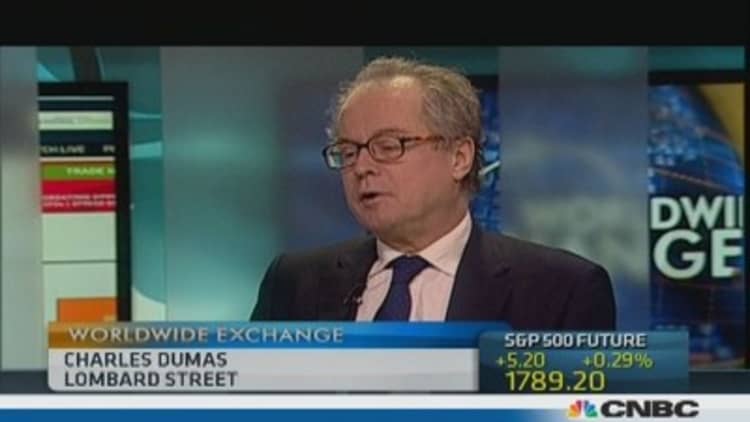Developed market assets are overvalued after a stunning rally in 2013, according to a survey of investors and analysts, who also said that emerging market equities were starting to look cheap.
In the fourth quarter of 2013, the number of investors and analysts who view developed market equities, government bonds and corporate bonds as overvalued compared to the previous quarter increased, according to a valuations index by the CFA institute of investment professionals.
Nearly half of the U.K.-based investment professionals surveyed (44 percent) saw developed market equities as overvalued, compared with 37 percent in the third quarter.
(Read more: Why the market could see a 17% drop in 2014)
Government bonds were the most overvalued asset class, according to 78 percent of respondents, while a third of investors said corporate bonds were overvalued.
"During Q3 (third quarter), there had been signs that our members believed we were moving towards a normalized market, with the diversity of investor opinion over the valuation of different asset classes narrowing," Will Goodhart, chief executive of CFA UK, said in a press release.
"The final quarter of 2013 marks a reversal of this trend, with the perception that asset classes are overvalued rising across the board, most markedly in developed market equities and government bonds."

Developed market stock indexes have seen impressive rallies this year helped by the U.S. Federal Reserve's unprecedented bond-buying program, with U.S. stocks ending the year at record highs, and the pan-European benchmark STOXX 600 clocking up annual gains of 17 percent.
(Read more: Goldman: Earnings set for growth in 2014, but correctionlooming)
But speculation about how and when the Fed would start to taper off its stimulus hit emerging markets hard over the course of 2013, amid investor concern that a withdrawal of liquidity would see investors remove their money from higher-risk stocks. The Fed announced that it would start winding down its bond-buying program in December.
The CFA valuations index found that investors now viewed emerging market equities as cheap, with half of respondents seeing them as undervalued -- and only 23 percent viewing them as too expensive.
The MSCI emerging market index has seen a 5 percent decrease for the year, after recovering from a plummet in June following initial talk of Fed tapering.
(Read more: 'Massive correction' for stocks and Treasurys in 2014: Pro)
Chris Williamson, chief emerging market economist at Markit, however, told CNBC that investors see a long term potential in emerging markets.
"Emerging markets have struggled, they lost favor amongst many investors, perhaps unfairly so, but there is still long term potential in those countries. Structural reform is the buzz word, but when you look at markets like China and India, there is good long-term growth potential still which perhaps hasn't been reflected in equity prices in the last year."
—By CNBC's Arjun Kharpal: Follow him on Twitter @ArjunKharpal


